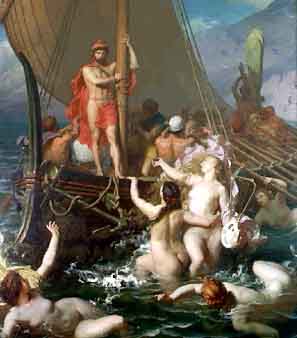
An analysis of astronomical references in the epic has led two scientists to conclude that the homecoming of Odysseus, usually considered a fictional character set in the context of a real historical event, possibly coincided with the 1178 solar eclipse. If, that is, Homer indeed had in mind an eclipse when he wrote of a seer prophesying the death of Penelope’s waiting suitors and their entrance into Hades.
The new interpretation of the eclipse hypothesis is reported in this week’s issue of The Proceedings of the National Academy of Sciences by Constantino Baikouzis and Marcelo O. Magnasco, scientists at the Laboratory of Mathematical Physics at Rockefeller University in New York and at the Astronomical Observatory of La Plata, in Argentina.
They concede that scholars of Homer are still not likely to give much credence to the idea. But it makes for an intriguing story, one that the blind bard, a mystery himself, would have appreciated.
Although an eclipse is not mentioned anywhere in the story, there are omens and what Plutarch inferred was a poetic description of a total solar eclipse. Odysseus has arrived home, disguised in beggar’s rags and in hiding before revealing himself. It happens that, when Penelope’s persistent suitors sit down for a noontime meal, they start laughing uncontrollably and see their food spattered with blood.
At this strange moment, the seer Theoclymenus foretells their death, ending with the sentence, “The Sun has been obliterated from the sky, and an unlucky darkness invades the world.”
There are reasons to think that the darkness of a total eclipse had just fallen on Ithaca. It was close to noon when the 1178 eclipse occurred over the Ionian Sea. It was, as mentioned several times in the story, at the time of a new moon, which the scientists point out is “a necessary condition for a solar eclipse.” And what better atmospherics to accompany a prophecy of doom than a total eclipse, which was considered an ill omen?
Experts on Homer have previously discounted such conjecture. For one thing, the earliest verified eclipse records are in the eighth century B.C., about the time Homer was writing but long after the action in what is known as the Trojan War, around the early 12th century B.C. Scholars say there is no evidence supporting a view at the time, widely quoted, that “a solar eclipse may mark the return of Odysseus.”
In their report, Dr. Baikouzis and Dr. Magnasco acknowledged the speculative nature of their study, several times throwing in their own caveats. “The notion that the passage could refer not just to an allegorical eclipse used by the poet for literary effect but actually to a specific historical one,” they agreed, “seems unlikely because it would entail the transmission through oral tradition of information about an eclipse occurring maybe five centuries before the poem was cast in the form we know today.”
The two scientists derived a possible chronology from astronomical references in the story, including the stars by which Odysseus navigated, the sighting of Venus just before dawn as he arrives at Ithaca, and the new moon on the night before the massacre of the suitors and the presumed eclipse.
On the basis of their analysis, the scientists said, these three “references ‘cohere,’ in the sense that the astronomical phenomena pinpoint the date of 16 April 1178 B.C.,” adding, “The odds that purely fictional references to these phenomena (so hard to satisfy simultaneously) would coincide by accident with the only eclipse of the century are minute.”
Cuando tuve la suerte de navegar por ese Mediterráneo que bañaba las costas de Grecia, arribaba cerca de la legendaría Troya en suelo turco o rozaba el paso de las Termópilas , tuve en cada momento la sensación de que en esas aguas se vivieron las leyendas mas increíbles de la humanidad. Todo rezumaba heroísmo. Gran azul. Pura épica.
No hay comentarios:
Publicar un comentario
¡Esperamos tu opinón!